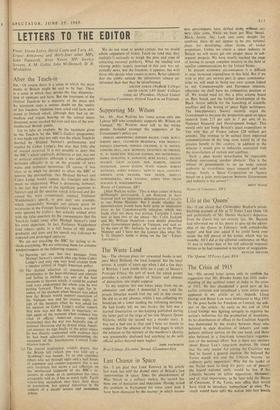LETTERS TO THE EDITOR
From: Steven bikes, David Cattle and Turk' Ali, Ernest Armstrong and thirty-four other MPs, John Papworth, Airey Neave, MP, Jocelyn Stevens, A. M. Gollin, John McDonnell, D. R. AI yddelton.
After the Teach-in
SIR.—Of course there is a sense in which the mass media in Britain might be said to be free. There is a sense in which they permit the free dissemina- tion of opinions and facts. But the treatment of the Oxford Teach-in by a majority of the press and by television casts a serious doubt on the reality of this freedom. Opinions were aired and facts were stated at Oxford which, although they had an im- mediate and urgent bearing on the central issues discussed, never reached they eyes and cars of the non- intellectual British public.
Let us take an example. By the treatment given to the Teach-in by the BBC's Gallery programme. it was made out that not only was the whole Teach-in dazzled by Michael Stewart's performance and regaled by Cabot Lodge's. but also that little else of interest occurred. It is not possible to deny that the BBC's whole' approach, deliberate or not, was one of political selectivity, although it was subsequently defended officially to us on the grounds of news value and technical necessities. Of course, it was clear to us when we decided to allow the BBC to televise the proceedings. that Michael Stewart and Cabot Lodge would capture the limelight and this much we understood. What is distressing, however, is the fact that most of the, significant questions to Stewart and all the speeches which followed and dis- cussed his, were scrupulously omitted. Professor Wedderburn's speech, to give only one example, which successfully brought out certain grave in- accuracies in the Foreign Secretary's speech, was not only ignored by Gallery, but actually wished away with the false assertion by the commentator that the
Teach-in faded away after Michael Stewart's (and his own) departure. in fact, Professor Wedderburn (and others) spoke to a full house of 900 under- graduates and dons and his speech was followed by repeated and prolonged applause.
We are not attacking the BBC for failing to in- clude everything. We are criticising them for extreme tendentiousness in the following respects:
(a) Showing not one but two passages from Michael Stewart's speech plus one from Cabot Lodge's and only one very brief excerpt from a speaker critical of Anglo-American policy.
(b) The slanted selection of questions, giving prominence to the least-informed and relevant
and failing to include, e.g. any of the four questions to Stewart which, it could be argued (and was), undermined the whole case he was
putting forward. There was no sign, for in- stance. of the moment when Stewart was asked how far Britain would support escalation of the Vietnam war and his evasive reply: no sign of the moment when he was asked for his opinion on Cabot Lodge's earlier remark that now was not the time to negotiate; no sign again of the moment when evidence was cited of official American sources which maintained that the war was basically one of national liberation and he denied using Ameri- can sources; no sign finally of the point where he was directly confronted with evidence that he had been selectively misrepresenting the statement of the international Control Com- mission reports.
(c) The overall implication, crudely drawn, that the British left (which one was told got a 'drubbing) was beaten. To us and countless others who sat through eight and a half hours of argument and counter-argument this is not only irrelevant but seems a sad reflection on the intellectual judgment of the BBC's re- porters, in whom, as its spokesman has since arrogantly told us. it has so much faith. Facile win-or-lose metaphors may have their place in journalism, but appear ridiculous in the context of a deeply serious and passionate debate, We do not want to sound cynical, but we would advise organisers of future Teach-ins (and may they multiply!) seriously to weigh the pros and cons of attracting national publicity. What the reading and viewing public largely received in this case was ad- mittedly news, but the freedom, it appears, lies with those who decide what counts as news, Better (almost) that the public outside the universities remain un- informed than that they be misinformed.
STEVEN LUKES (Nuffield College) DAVID CAUTE (Ali Souls' College) TARIQ ALt (President, Ox/id Union) Organising Cmtimittee, Oxford Teach-in on Vietnam






































 Previous page
Previous page